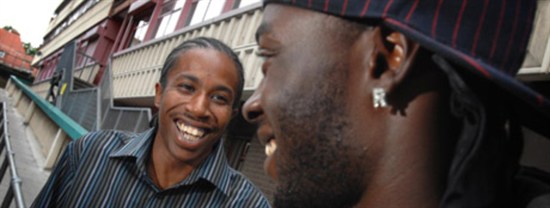You don't have to be ruthless to succeed in life
14 Sep 2012 | Molly Aldam

In our society there is a strong emphasis on competition. We are
told in school that we must be better than our peers in order to
beat them in the race for places at the best universities. Later,
we go up against other people at job interviews, knowing that for
us to get the job, they will have to lose out. When we try to move
up in our career, again we will have to compete against our
colleagues for the promotion. So is it possible to get anywhere in
life without kicking others down on the way?
On 17th August I went to a debate at the Bernie Grant Arts
Centre in Tottenham on the topic "Don't we we need to be ruthless
to succeed in life?" It was attended by David Browne, Mayor of Haringey, Junior Smart, who started the SOS
project, and several young people and youth workers.
We began the discussion by questioning what is meant by success.
If success is defined by the amount of money that is made, perhaps
an attitude of ruthlessness is necessary. The debate became quite
philosophical as we went on to discuss whether wealth and material
possessions can really make us happy, especially if at the same
time we are hated for being ruthless. It is clear that if instead
we are compassionate, not only does it make us feel happy but it
also benefits the people around us. Most people were of the opinion
that while succeeding at the expense of others may mean people
admire us, this is not as valuable as friendship. People who live
with compassion naturally tend to invite more respect, fuelled by
love rather than fear. If somebody who had reached a high position
by means of ruthlessness lost all their money or fell ill, fewer
people would be willing to help them.
However, we agreed that avoiding ruthlessness does not mean we
should not be driven while working towards a goal, and that it may
be necessary to disappoint some people for the greater good. David
Browne said that to succeed in life we should be ruthless on
ourselves. One person made the point that some employers are
prejudiced against people of certain ethnicities, social classes
and so forth, and these people may have to be ruthless.
The debate concluded with the sense that a shift in attitude is
needed. For a fairer world, we all must change the way we view
others by looking for the similarities between us rather than the
differences. Empathy is the antidote to fear of others, and in my
opinion, fear of others is what leads to hatred, as well as the
wish to ruthlessly boost our own position.
For me, the highlight of the debate was hearing the life story
and views of Junior Smart. He is an ex-offender who discovered
while in prison that the British penal system does not address the
root cause of gang crime, with 75% of young offenders reoffending
within 2 years of leaving prison. As a result, he initiated St
Giles Trust's SOS project, which helps gang members across
several London boroughs break the cycle of reoffending and turn
their lives around. With compassion as his motivation, Junior Smart
has made a great success of his life and helped many others do the
same - his case proves that we can succeed without being
ruthless.
The debate was extremely enlightening and I believe that the
benefits of living compassionately should be talked about more
often.


Molly Aldam is a 17-year-old student living in Haringey. She
took part in a youth debate to mark the anniversary of
the riots that took place in Tottenham in 2011.
The debate was organised by Mind with
Heart and the Foundation for Developing Compassion and
Wisdom, the charities behind the Empathy and Compassion in Society Youth
Gathering will take place at the London Southbank
Centre on 22 November 2012 from 9.30 to 12.00 am. Youth clubs and
schools are invited to register their interest with [email protected]
Tags:
Do things for others, Family & friends, Local community